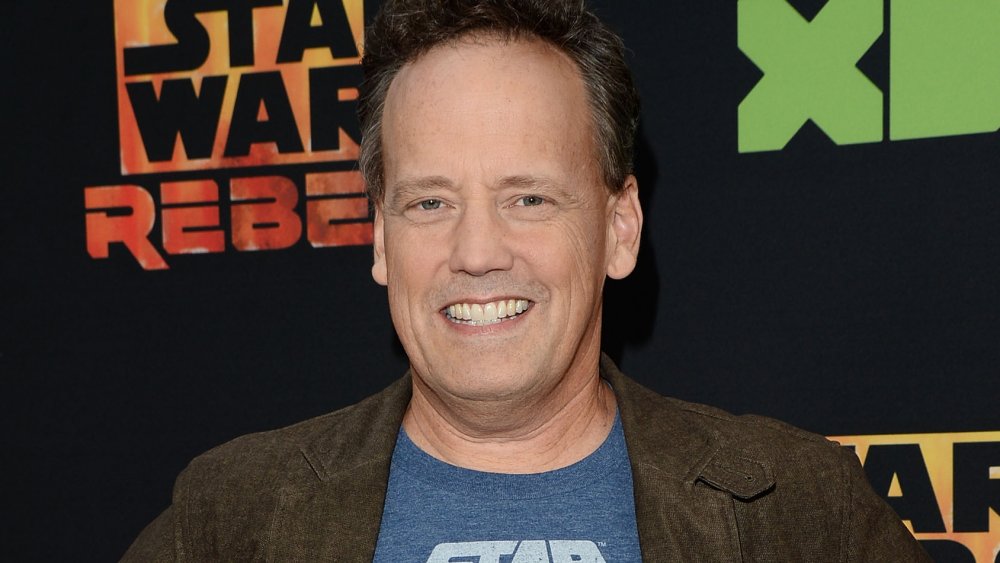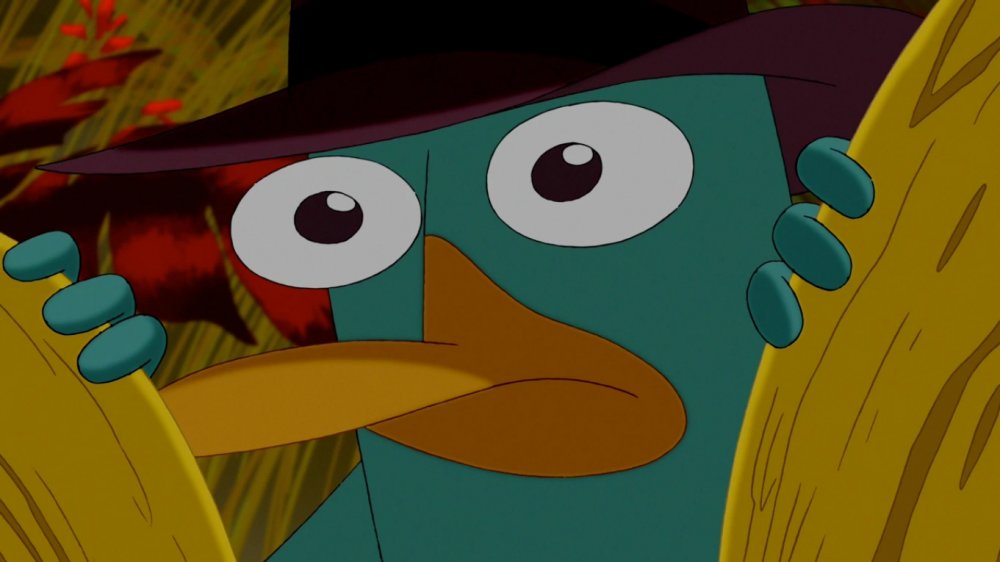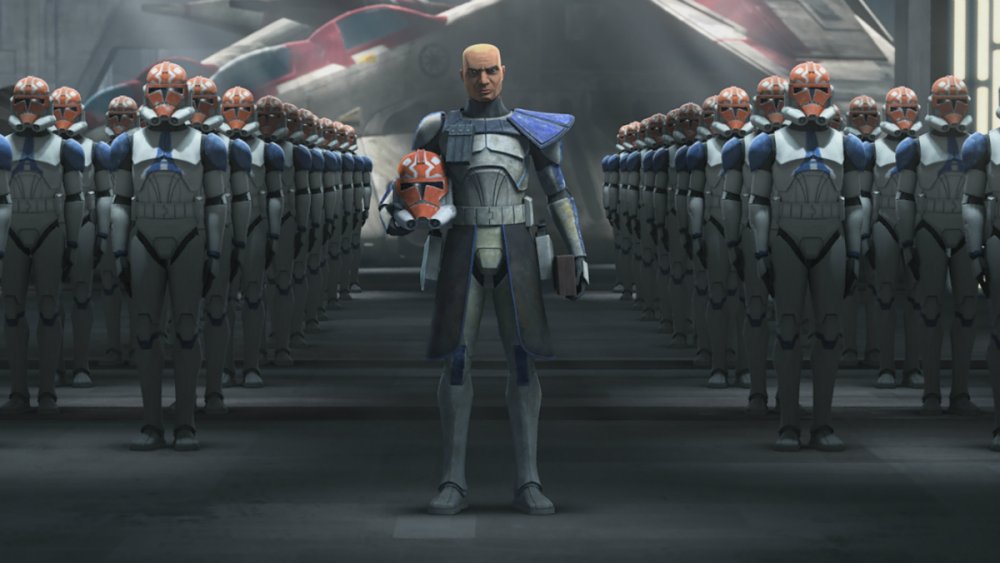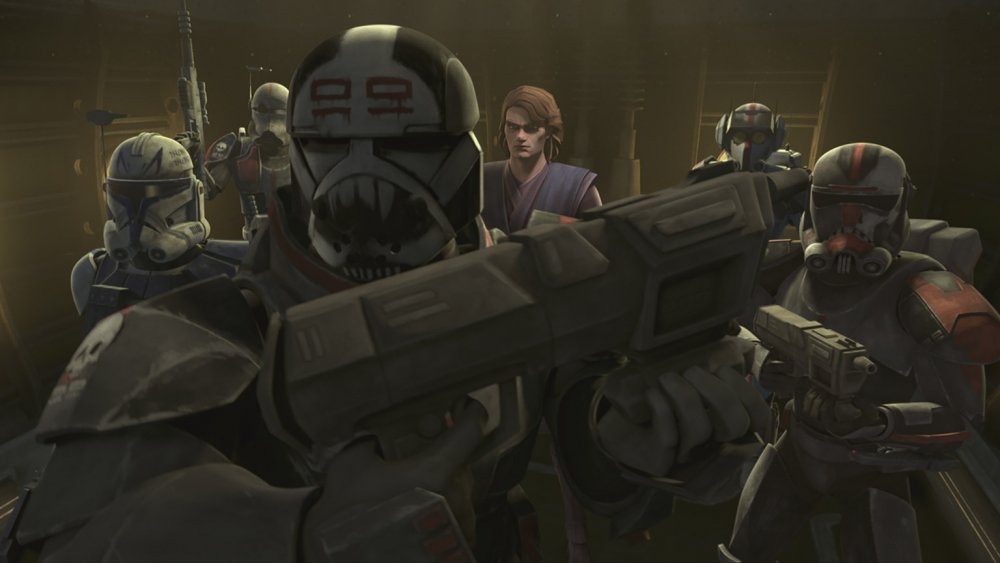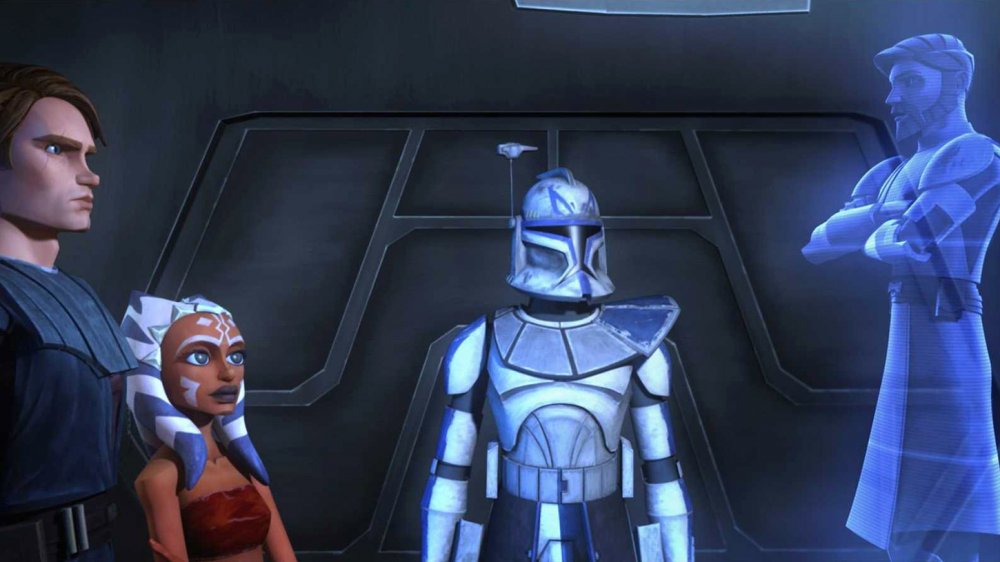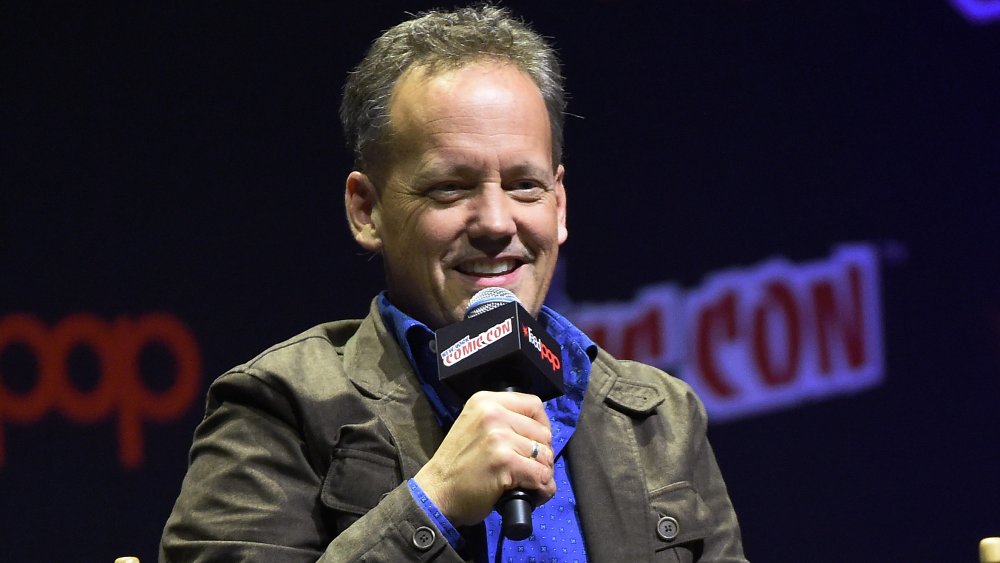Voice Actor Dee Bradley Baker Dishes On Star Wars: The Clone Wars - Exclusive Interview
Even if you don't recognize Dee Bradley Baker's name, you've probably heard his voice. He played the towering idol Olmec on the '90s Nickelodeon game show Legends of the Hidden Temple. He brought the breakout star of Disney's Phineas and Ferb, Perry the Platypus, to life. He's the man behind the various critters on Avatar: The Last Airbender and its sequel, The Legend of Korra, he played Daffy Duck in Space Jam, and his voice is all over hits like SpongeBob SquarePants, Adventure Time, video games like Overwatch and Portal 2, and plenty of other hits.
But even with over 600 credits to his name, Baker's work on Star Wars: The Clone Wars stands out. On the series, which is set between Attack of the Clones and Revenge of the Sith, Baker voices every member of the Republic's clone army. It's a remarkable showcase for the veteran actor, who must give different characters, most of whom sound almost exactly the same, unique identities and personalities. Often, he's playing multiple parts in a single scene. Sometimes, he's the only actor in an entire episode.
As The Clone Wars returns to Disney+ after an eight-year hiatus for its seventh and final season, Baker took a few minutes to talk to Looper about his career, his time as part of the Star Wars universe, the Bad Batch arc that kicked off the recent Clone Wars revival, and much, much more.
The road that led Dee Bradley Baker to The Clone Wars
How did you get started in voice acting?
It's something I stumbled into by the time I was about 30 years old. Never was really a goal, it just gradually clarified as I did things that seemed like fun to me. After college, this was the best way to have fun and earn a good living and give me the lifestyle and artistic variety, more than anything else that I tried, so I just ended up moving into it. And by the time I was late 20s, really early 30s, that's when I probably would've said, "Well, I guess I'm a voice actor."
But if you caught me in my mid-20s or early 20s or earlier, I would never say that I am an actor or I'm going to be an actor. I had no idea what I was going to be. I liked a lot of different things. I had a lot of experience. Since second grade, I'd done a lot of plays and musicals, and I had a really great drama teacher in high school, who had us doing really advanced, interesting stuff as well as musicals and straight-ahead stuff as well. I really liked doing it, I just didn't think I was all that good.
I also had a habit of creating sketches and audio plays and stand-up comedy and live performances with my friends. I did that from high school through college and then just kept doing that, but that was a hobby to me, that was never anything in my mind more than a hobby.
I made audio tapes when I was a kid. I was messing around with my voice. I tried ventriloquism for a while. I did a lot of improv and some stand-up and I liked popular culture and monsters and video games and movies and reading and science fiction and music. I mean, I just liked a whole eclectic mess of things that I just splashed around in for always. I mean, that's all I did. I'm a dabbler. I just dabbled in stuff I liked.
As a voice actor, you're known for playing animals and creatures in addition to more human characters. How do you develop that skill?
The animal and creature stuff rests on a bed of a number of things that I have inside my inner Rolodex of inspiration and abilities. I've always liked animals. I always liked biology classes. Biology classes, some of those were some of my favorite classes in college that I took. And I always loved documentaries. Jacques Cousteau, Wild Kingdom, Cosmos. I loved science documentaries and I loved animals. I thought animals were really cool. But I didn't really have enough of a mathematical mind to follow into something like entomology or medical science or anything like that, and then you add to that that I really like monster movies and I like video games.
I also like live performing, and in particular improv. My own personal version of improv tended to be weird, outrageous, over-the-line characterizations and weird vocalizations. I think that's just how I got attention and what people responded to.
So, you mush those things together, in addition to a lot of performing of musicals and Shakespeare and theme park shows and singing telegrams and everything. It all mashed together into this goulash that tasted like voice acting, and that really enabled me to be able to do creatures and monsters.
So, once I got out to L.A., I started just trying lots of different performing, and then it became clear to me that they like creatures and monsters. There's a need for that in animation. And I like doing it, so why don't I? I'm not inhibited. A lot of trained actors are not going to be walking around doing the stuff that I do with my voice. It doesn't serve an actor's vanity to be inhaling a scream while you're driving around in a car. But for me, I didn't care because I just liked doing that kind of stuff.
So, I started building up a Rolodex of sounds that were expressive and that didn't damage my voice. It also helped that I had a good singing teacher for a couple of years, a fellow named Manny Lou Hahn in Orlando, who's no longer with us, who was also a good part of my vocal training. I could really use my voice a lot, while I lived in Orlando, with various kinds of performing, but doing it in a way that didn't hurt my voice. That prepped me for coming out here and being able to do the extreme stuff, like monster roars or vampire screeches or even a mouse or an elephant or whatever. And I can do those things. I can perform it well without hurting myself.
Then, because I have an actor's sensibility, I can see the storytelling that needs to be involved with the performance. I'm not just making a sound effect. That's really key to it. Some people can do funny sounds, they have some showoff sounds they can do, but that's not what I'm doing. What I'm doing is problem-solving a story by channeling my acting through sounds.
I was just uniquely set up for that. I could not only do it, but I liked doing it. About half of what I do is monsters and creatures and animals and aliens and weird stuff like that. A very far cry from the clones, but it's great fun and I love that kind of stuff. I'm in my studio right now, in my garage, and I'm just surrounded by dinosaurs, which was a real love of mine as a kid, and all kinds of monsters and creatures. I love being surrounded by creatures and monsters and dinosaurs. I feel at home and I feel energized and inspired and I draw enthusiasm from the energy of these nonhuman creatures.
How Dee Bradley Baker keeps all of the clone straight
For you, what makes Clone Wars a unique project?
My work on Clone Wars is like nothing else I've ever done. First of all, I've loved Star Wars since I was a kid. I've got a picture of me — I think I've got it on Twitter and probably on Instagram — in a Jawa costume that my parents made for me in October of 1977. I thought Star Wars was really cool. I watched it all summer long, the second summer that it was re-released. This is a universe that I dreamed of being a part of the creation of.
I was going to send George Lucas, when I was a kid, some drawings that I had of aliens and creatures because I wanted to make aliens and creatures. Oddly enough, it's like I kind of knew what I wanted to do but I just didn't know how to say it. And I was too afraid to send it to him. And here I am in the middle of Star Wars, being a part of all these great, fun shows, from the animated series to even the movies and video games as well.
That alone is very exciting. It's like nothing else that I've ever done or ever could do. There's nothing else that I love like I loved Star Wars, except maybe Planet of the Apes, when I was a kid. And then, the other aspect is the acting challenge of being these different clones, the Bad Batch, and keeping them distinct. It's a very straight-ahead acting exercise. It's really interesting and really fun and actually scary. And I don't think I'll ever see anything like that again in my life, in my career. I mean, there's nothing to compare it to.
So those two aspects of it make it a unique project, a unique thrill in my career. I've been out here almost 25 years, in Los Angeles, and been performing since I was nine, off and on at least, and there's just nothing like it. It's such a great thrill to be involved at this level with this army of artists and technicians who are just so brilliantly talented, and to be able to collaboratively make this level of entertainment, it's really gratifying. It's just great, and it's a bonus that it's creatively challenging. It's also... there's a little boy in me that loved Star Wars since I was a kid.
How do you keep all the different clones straight? Because they all sound similar but they're not exactly the same.
No, they are not the same. They're even more different once you add the Bad Batch in there. But that's all done from the script. The script will usually lean a character one way or another. And then I map that out with Dave Filoni or whoever is in the booth so that we have a tone of authority or of age or of swagger or whatever you want to pin on that clone.
But it probably comes down to maybe an adjective or two, is how I conceive of it. I may even shorten that down into a shorthand of a little symbol next to the name if I need to, but generally speaking, it's like I can see them. They feel like different people to me, and I can just switch back and forth. It's like being a piano player and you're asked like, "Well, how do you play a jazz tune and then a Mozart and then Cole Porter and then a nursery rhyme? How do you play those songs one after the other?" And the answer is, "Well first of all, I have the facility and second of all, I can just see it. I see it and it just comes out." At least, that's how it feels to me.
It looks a magic trick when you see it. It looks impossible because of the disparity of what you jump into, but because you have those specific modes defined within you, you can jump from character to character like you're jumping from rock to rock in a stream.
What makes The Clone Wars' Bad Batch storyline so special
Do you have a favorite clone to play?
I mean, I really like Rex. I love Rex because he endured it and he made it all the way to Endor. But I also really love Cut Lawquane because he's a dad. I found him a standout, interesting. I really like 99, he's a unique, heroic one. I like Fives just because it's such a tragic and heartbreaking story. And I got to say, I really like the Bad Batch. I think these guys are really fun and interesting, a great fun dynamic. It's a fun little carnival when you got those guys running around. It's great fun.
These Bad Batch episodes started production a decade ago. Did you have to record new dialogue for the new season?
Yeah. Some of the dialogue is new, but most of it was what we recorded originally when George Lucas was directly involved with The Clone Wars. So really, the Bad Batch arc, as far as I understand it, is the final Star Wars that George Lucas was directly involved with. That's a unique thing. It's a really unique thing.
When he sold to Disney and left, it was the end of an era, the end of a guy who is both the creator and the owner of the creative engine. That just doesn't exist. There's nothing like that. And so, when he stepped back, it was the end of an era. And happily, under the new stewardship, a really awesome Star Wars is coming out, and among that is the Clone Wars that's coming out right now. But yeah, there's something special about the Bad Batch arc for me, because this is the end of George Lucas' direct, hands-on influence with the creation that he started clear back in the '70s. I mean, that's a remarkable thing. That's a unique and remarkable thing.
Did you work with George much directly?
Never. Never. He said hello to me, I think, twice and that was it. The writers and the other show creators and everybody else, they worked with him directly quite a bit but I, literally, all I got was two hellos and that's all. Can you imagine? I've been in so much of his universe but I've just been able to say hello a couple of times and that's it.
You have so many scenes in which it's just clones. Some episodes only have your characters. What's that like in the recording booth?
It's like playing Dungeons and Dragons by yourself. It's a weird, lonely enterprise. Those in the booth on the other side of the glass are sort of your audience, but ultimately, it's the theater of my own mind, where I can see this playing out as I'm performing these characters.
For the most part, we just read the thing straight through. I don't do them separately anymore. There was a while originally, when we started Clone Wars, where I would record them separately. But yeah, it's very odd. The closest thing to it is a video game record where you're by yourself and you're doing a lot of lines. But this is unique, where you're actually performing an entire scene, doing all of the characters in a scene. That's just not like anything.
Occasionally, you have that in animation because we typically do two or three characters in an animated episode, and it'll sometimes happen where you're talking to yourself. That's fun and interesting and a fascinating little magic trick to watch, but this is a whole other level. To do an entire 22-minute episode that's just like, 90 percent me talking to myself, there's just nothing like that. It's very odd.
Frankly, it's great fun. I like having a scene where I've got other performers there and we're performing a scene. I like that. I prefer that as an actor. You get into acting partially to have the audience love you, but also to have the experience of the voluntary family that is theater, that's doing a show together. I like that. If I had my druthers, I'd rather have Anakin and Ahsoka and whoever else, there with me doing a scene rather than just me by myself.
Why the characters on The Clone Wars aren't exactly like their movie counterparts
Do all the actors record their lines together, or do you record separately?
We're all together in the booth, typically. Sometimes someone's not there and we have someone read in for the person who's not there, but generally they like to record with as many people in the scene as possible, in the booth.
Is there anyone on the show that you feel hasn't gotten the attention that they've deserved from the fans, or who you particularly enjoy working with?
I mean, everyone gets a lot of love but I really miss Nika Futterman's Ventress. I really loved that character. I loved what she did and what Nika brought and I really miss that. I'm not sure if that character will ever come back. It sounds like they did her in in the extended universe, I didn't really follow that. But I sure liked Ventress. And I really, really liked the Mother Talzin and the Sith witches. I thought they were really interesting and really fun and I miss those characters, just personally.
On the show, you're doing a voice that's inspired by Temuera Morrison in Attack of the Clones, but it's not an impression. It's different. How did you go about developing that voice?
Well I think that's how it organically played out when we started The Clone Wars. I think James [Arnold Taylor]'s Obi-Wan became his Obi-Wan. It started closer to the reference but it was his thing. Anakin, of course, now that's a straight-ahead impression, and then they replaced him with Matt [Latner] who took the character and the voice in a very different direction. At first, they weren't sure if that was going to read okay or if that was going to be jarring. I think it worked beautifully.
Our goal was not one of fidelity to the prequels. That was clearly the reference point and the starting point, but where it took us became its own thing, and that's the way it just kept playing.
In addition to The Clone Wars and Rebels, you've also played the clones in video games. How is the process of recording a game different from a TV show?
A video game voiceover session is different from an animated series voiceover session in that it's always only you. In animation, you're often with a group. Sometimes alone, but often with a group. In a video game, you're just going to be reading a lot of lines and it's only going to be you, and often you're fighting, you're dying, you're falling, you're getting shot, hit, you're attacking someone, you're getting burned alive. It's much more punishing vocally, in terms of the amount of work and the amount of punishment that you take from the work, because it's usually war. There's some version of war if it's a video game.
Whereas in animation, you may have that. Star Wars is a lot of war, but there are also quieter scenes, and there's time to rest your voice within the four-hour session. It's typically, at most, a four-hour session for animation. Often, it's less than that. With a video game, it's often the full four hours and it can be quite punishing.
What fans can do if they want to be the next Dee Bradley Baker
You're pretty active on the convention circuit. Have you had any particularly weird or memorable experiences with Star Wars fans?
I can't think of any experiences I've had in a convention that I would call weird. It's mostly just being overwhelmed by a sea of genuine, sweet, thoughtful, deeply connected enthusiasts for what I do. It's an overwhelming, positive affirmation of what we create. You don't really get that as an actor in a voiceover studio. You don't get the audience, but when you're at a convention, you really get to see how this touches people, and it's really very nice.
I mean, some people just want to collect and sell your signature and that's not very pleasant, but a lot of people are just families or soldiers or parents with their kids, or kids who just love this so much, or collectors that just love it deeply. They really base their lives around this and they connect themselves to each other and it inspires creativity. All of these really positive things about being a human have come out from their deep love of something like Star Wars.
You go to San Diego Comic-Con and you have any number of mythologies that co-mingle under one big roof. Which, to me, is a really positive and affirming image of humanity in and of itself. It's seeing that what I make is not just making potato chips. It's something that means something to a lot of people. It's gratifying to be a part of that.
It's also nice to see people getting along with each other, like at a convention, where they might be into different mythologies or different forms of enthusiasm, but all are included. It's this non-exclusive embrace of difference. Things that other people may be into is not a threat, it's actually an affirmation and a good thing. That, to me, is encouraging and it's hopeful and it leads to optimism, to see that.
I think the worst thing in all the years of going to San Diego Comic-Con was when somebody got upset in line and stabbed somebody else with a pencil. I think that's the worst thing I've ever heard of happening at San Diego Comic-Con, which, if you've ever been there, is a zoo of tens of thousands of people. It's crazy. People are walking around with simulated guns and armor and camo and all of these monsters, and you would think that there would be defensiveness or anger or some territorial thing going on. You know, the Star Trek people hate the Star Wars people, or whatever. But you don't see that. It's completely inclusive and embracing of everybody there. It's really just this wonderful affirming thing to me. I think it's really remarkable.
Your website offers a lot of advice for aspiring voice actors. In your opinion, if people want to break into this industry, what do you think is the most important thing that they can do?
If you want to break into the industry, you start by breaking into the artistry. You want to become an actor. You want to become somebody who enjoys performing, who is good at it, and who brings an artist's confidence to it. Then, from that, once you find that and affirm that, then you can begin to see if being an entrepreneur of that kind of a thing works for you. You ultimately have to be an entrepreneurial artist, but you don't start with the entrepreneurial part. You start with the artist part, in my opinion.
So, to start, as I detail extensively on my site, have fun with it. You start by having fun. Putting yourself out there and finding out what kind of a performer you are and what you've got inside of you and learning from those who are better than you are and just putting yourself out there and seeing if this suit fits.
Then, once you affirm that, you might say, "Oh, well, I guess this will just be a hobby, but I think that's as far as it's going to go. It's fun and I just keep doing it because it's fun." There's no reason not to do something because it's fun. That's a great reason to do it. But, if it's fun and you're really, really good at it — and only an audience can tell you that, only a casting director or the head of a theater company who casts people can tell you that — once you've affirmed that, then you may conspire to take it to an entrepreneurial, possibly professional level.
I go through that extensively on my site, in terms of having fun, and the exploration part. Then also, the entrepreneurial, business mindset that you eventually have to have if you want to be a professional. But it starts with the fun. It starts with the artistry and the fun and the fear and the roar of the crowd and the smell of the grease paint.
